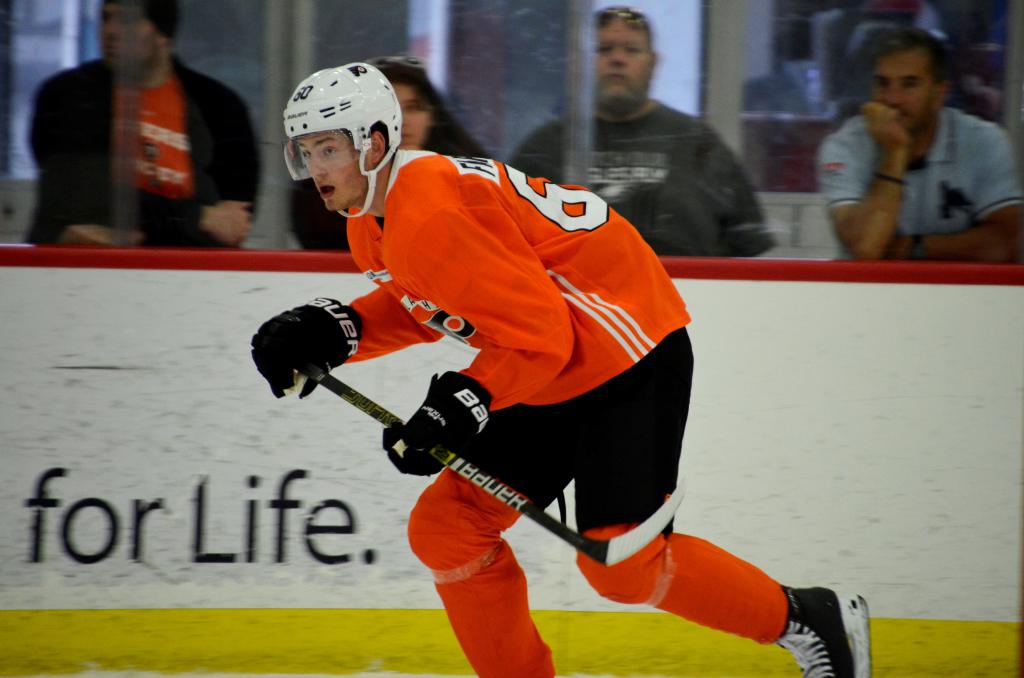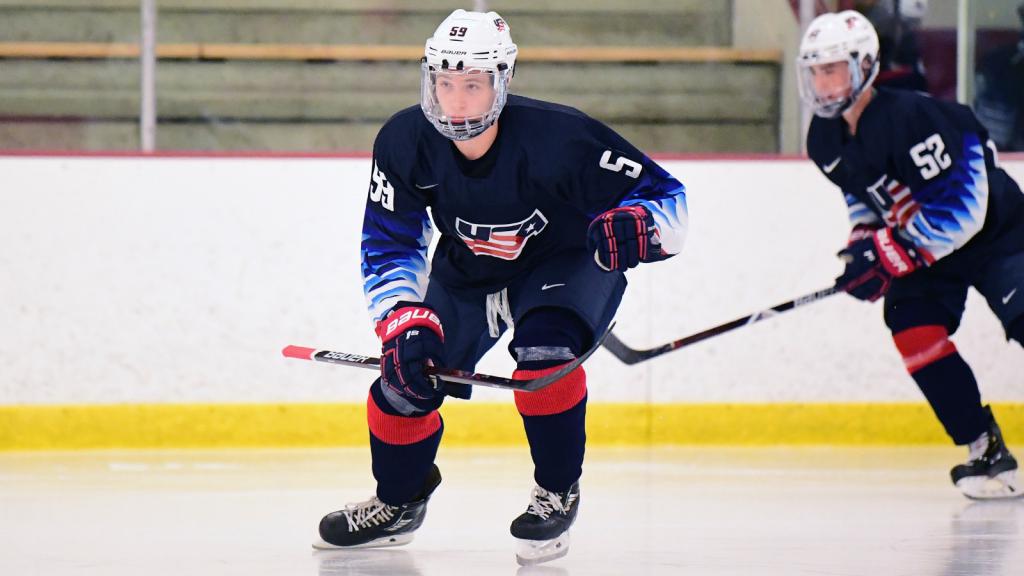ROBENHYMER: Arizona State University’s Johnny Walker is Taking the Road Less Travelled, Hopefully to the NHL
At 18-years-old, Johnny Walker was struggling to find success in the North American Hockey League.
Five years later, he’s one of the best offensive producers in college hockey with 68 points in 70 games, including 44 goals, putting the 23-year-old junior squarely on the radar of NHL scouts as a potential free agent signing at the end of the season.
It’s an opportunity that might never have happened without some tough love from his coaches.
The Scottsdale native was starting his second season in the North American Hockey League when Arizona State University surprised the college hockey world and announced that they were going to launch a Division I men’s hockey program. Walker couldn’t reach for his phone fast enough to ask his coach if he knew how to get in touch with ASU head coach Greg Powers.
“I didn’t think about it for even a second. It was automatic,” Walker said emphatically. “I wanted to be a Sun Devil. There was no doubt in my mind.”
But as far as Powers was concerned, there was a lot of doubt that Walker would even play college hockey, let alone for Arizona State.
“We liked the idea of having a local guy on the team, but we also weren’t interested in giving roster spots away because of that. We needed guys who were committed to playing at a high level and could lay a really good foundation for the level of success we expect from our program and, quite frankly, we didn’t know if Johnny fit that description.”
At the time, he was 6-foot-1, just shy of 230 pounds and slow as molasses on his skates.
“He asked to meet with me and when I sat down with him; I was like look, if you took your shirt off and I took mine off, I’d look better than you and I’m 20 years older and don’t play hockey. It’s not supposed to be that way,” the coach explained. “He needed to get in shape and show us that he was serious about being a college hockey player before we’d even think about giving him a roster spot, nevermind a scholarship.”
Walker left that meeting determined to lose the weight, get stronger, faster and in better shape so he could earn the opportunity to be a Sun Devil.
“Yeah… I was pretty big and needed to work on my conditioning quite a bit,” he admitted. “I also needed to be a lot more disciplined with what I ate. That was my biggest issue. I was willing to go hard in the gym and put in the work on the ice, but I just ate whatever I wanted and wasn’t looking at food as fuel for my body and it showed. I was really out of shape.”
By the next season, Walker had lost ten pounds and, after being drafted by the Chicago Steel of the USHL that spring, went into training camp ready to impress, but instead, he got another heavy dose of reality.
“When it came time to make the team and earn a spot, they sent me to the NAHL,” Walker explained. “It was a huge slap to the face and big wake up call for me to get my act together because I definitely thought I should have made the team skill-wise. I was right there, but, once again, the issue was my conditioning. I had gotten better, but it wasn’t enough.
“Coach Dan Muse flat out told me I was out of shape and he wasn’t playing me. I knew right then that I needed to figure it out ASAP because I was 19 and wanted to play college hockey, not men’s league.”
After being a point per game player in the NAHL that season, Walker had been offered a scholarship at ASU and the Steel drafted him once again, this time with their first-round selection, 11th overall.
“I knew the two most important people — my coaches — believed in me and thought I was on the right track. Arizona State wouldn’t have made me an offer and Chicago wouldn’t have drafted me so high if they didn’t believe in me and that gave me a lot of confidence that if I could just drop some more weight and get in better shape that I could really have a chance to do something,” Walker said. “But that’s when Coach Muse gave it to me straight. He said, ‘If you’re not 190 by the start of training camp, don’t even show up.’
“It was a big dose of tough love and I can’t thank him enough. He saved my hockey career. He said I was a great player, but that I wasn’t going to play anywhere like that and he was right. So, I worked really hard that summer. Really hard. I was determined not to let this opportunity pass me by.”
Walker put in the work and exercised some discipline that summer to lose over 30 pounds. He showed up to training camp weighing just under 190.
The then-20-year-old notched 16 goals and 13 assists for 29 points in 41 games, plus another five points in the playoffs as he helped Chicago win the Clark Cup as USHL Champions.
Heading into his freshman season at Arizona State, Walker knew he had more work to do, especially when it came to his body composition.
“When I first got on campus in the summer, my body fat was 19.9%, almost the 20 bomb,” he said with a chuckle. “But, now that my weight was better, I started focusing more on cutting the fat and gaining lean muscle. The coaches told me to keep my weight between 180 and 190 and to get as close to 10% body fat as I could. They said, you can play hockey at this level or you can have the cheeseburgers and that’s when I decided that no cheeseburger tastes that good.”
Walker started his freshman season at 185 and got leaner as the season went on while scoring 17 goals and 24 points in 32 games for the Sun Devils. His strong season raised some eyebrows among NHL scouts, especially the Columbus Blue Jackets who invited him to their development camp.
In his sophomore year, Walker’s body fat was between ten and 11-percent while maintaining his 185 pounds and scoring 23 goals and 34 points in 32 games. He finished in a five-way tie for second in goal scoring in the country despite playing at least seven fewer games. Columbus again invited him to their development camp, but they weren’t the only team interested in the opportunity to woo him as a potential free agent signing. A handful of teams reached out and there was even chatter that he might not return to Tempe for his junior season, but Walker wasn’t done at ASU yet.
“I signed up to be part of something special. No one — except us — thought we could make it to the NCAA tournament last year, especially without a conference,” he said. “But we did and we know we can do more and I want to be a part of it. I want to help this team win a national championship.”
There are also some aspects of his game he’d like to work on. As the driving force behind ASU’s offensive attack, Walker is known for his willingness to do the hard work in the dirty areas to retrieve or maintain puck possession, has good vision, a quick release and an accurate shot, but he’s working on getting stronger and continuing to get leaner, clean up his defensive zone coverage and getting faster.
“I think, offensively, I’m pretty skilled and able to make plays when I create a little time and space and even grinding it out down in the corners. I like to play a hard heavy game and generate offensive opportunities that way,” explained the 23-year-old. “But, I’ve never been fast and I don’t know that I’ll ever qualify as fast, but I can get faster and have quicker feet and I can get stronger on my skates to help me win more one-on-one battles and, of course, continue to work on my conditioning and, then, just bring everything up to the next level to prepare myself for the next step in my career.”
If Walker continues to put up offence at a point-per-game pace, he could find himself in contention for the Hobey Baker Memorial Award while leading Arizona State to back-to-back NCAA tournament appearances, not to mention the opportunity to accomplish the lifelong dream of becoming a professional hockey player when the season is over.
“My coaches and trainers these past few years have been amazing and not only did they help save my hockey career, but they saved my life too. I was so unhealthy and it’s amazing to think of where I was four years ago and where I am now and it’s incredibly motivating to think of where I could be four years from now, if I continue on this path and keep improving.”
“So, I’m just trying to push forward and make the most of it,” Walker said. “I know I’m very fortunate. I feel like I’ve gotten a second crack at this and a lot of guys don’t even get one. With the opportunity I got in Chicago and then the opportunity I’ve gotten here, like… I just couldn’t be more grateful and I’m definitely not going to waste it.”


-1607995227-1024.png)
